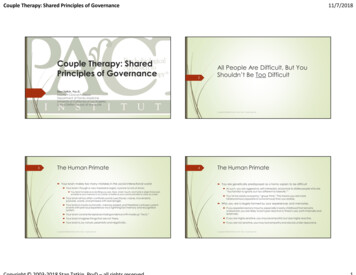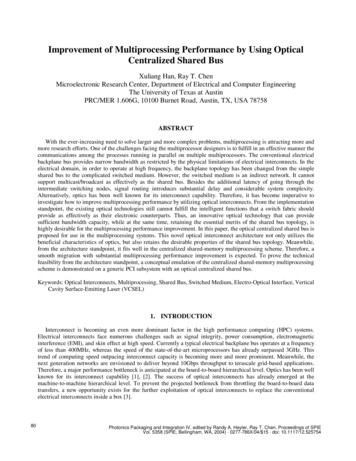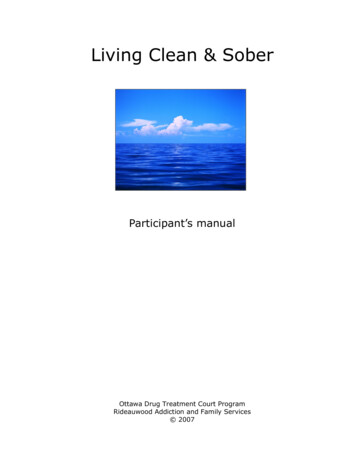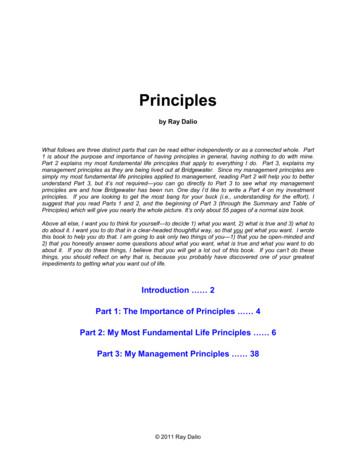
Transcription
11/7/2018Couple Therapy: Shared Principles of GovernanceCouple Therapy: SharedPrinciples of Governance2All People Are Difficult, But YouShouldn’t Be Too DifficultStan Tatkin, Psy.D.Assistant Clinical ProfessorDepartment of Family MedicineUniversity of California at Los AngelesDavid Geffen School of MedicineCopyright 2003-2018 Stan Tatkin, PsyD - all rights reserved3The Human PrimateYour brain makes too many mistakes in the social-interactional worldYour brain, though a very impressive organ, is prone to lots of errors.You tend to believe everything you see, hear, smell, touch, and taste is objectively real;or believe your memory is accurate; or believe your communication is clear as a bell.Your brain all too often conflates social cues (faces, voices, movements,postures, words, and phrases) with real danger.Your brain is mostly automatic, memory-based, and therefore confuses currentevents with previous experience via a lightning fast memory and recognitionsystem.4The Human PrimateYou are genetically predisposed as a homo sapien to be difficultAs such, you are aggressive, self-interested, and prone to dislike people who are“too familiar to ignore, but too different to tolerate.”1You’re too easily swayed by “group think.” This means you are moreheteronomous (opposite of autonomous) than you realize.Who you are is largely formed by your experiences and memories.Your brain constantly replaces missing evidence with made up “facts.”If you experienced any trauma, especially in early childhood that remainsunresolved, you are likely to be hyper-reactive to threat cues, both internally andexternally.Your brain imagines things that are not there.If you are highly sensitive, you may be empathic but also highly reactive.Your brain is, by nature, pessimistic and negativistic.If you are not sensitive, you may lack empathy and also be under responsive.Copyright 2003-2018 Stan Tatkin, PsyD - all rights reservedCopyright 2003-2018 Stan Tatkin, PsyD - all rights reserved
11/7/2018Couple Therapy: Shared Principles of Governance5The Human Primate6Your development plays a consider role in how difficult you areWe also live a lot longer than either non-human primates or our recentancestors.Ability to manage your impulsesAll this suggests the value of taking active steps to ensure the longevity ofour relationships.Ability to tolerate frustrationAbility to shift your attention at willRomantic love waxes and wanes over time.Ability to manage your state of arousalMutual physical attraction can dim as our bodies undergo slow butinevitable changes as we age.Ability to socially-emotionally act and react appropriately under stressAbility to make decisionsCommon interests also change as we are exposed to new experiences,attractions, and pursuits.Ability to override what feels good for what does goodAbility to remain self-aware in real timeOne of nature’s little jokes is to turn what attracted us to another personinto what may eventually annoy us.Copyright 2003-2018 Stan Tatkin, PsyD - all rights reserved7Shared Principles of GovernanceAs social animals, we depend on each other for survival on many levels:physically, psychologically, emotionally.In the wild, primates procreate and pair bond, on average, for four years:enough time to raise one child and protect it from the hostile environment.Shared Principles of GovernanceCopyright 2003-2018 Stan Tatkin, PsyD - all rights reserved8Shared Principles of GovernanceSocial contract theory focuses on whether agreements between people arebalanced, fair, and just.Theory traced to Thomas Hobbes, John Locke, Jean-Jacques Rousseau, andmore currently John Rawls (1999).Nature cares not about long-term relationships.Most of us modern humans, however, do care because we are part of asociety that values, even requires, cooperation, collaboration, and socialfidelity to agreed-upon principles of governance.Copyright 2003-2018 Stan Tatkin, PsyD - all rights reservedLawrence Kohlberg (1971) made ability to form social contracts definitional tostage 5 in his theory of moral reasoning development.Ivan Böszörményi-Nagy (1973) used social contract theory to explain whyfamilies who expected loyalty despite a climate of unfairness or injusticecreated individuals who felt angry and later attempted to settle their scoreswith spouses, employers, and others.Copyright 2003-2018 Stan Tatkin, PsyD - all rights reserved
11/7/2018Couple Therapy: Shared Principles of Governance9Secure Principles of Governance10Shared Principles of GovernanceSecure functioning partners are equals and held to mutually agreed uponprinciples of governance.Principles, unlike rules and laws, are beliefs. I strongly discourage you fromthinking in terms of rules. People may break rules and laws but breakingone’s principles is akin to being untrue to oneself.Without a common purpose that serves both partners the default will be thewild west.How are the two of going to govern—each other and everyone else? How areyou going to protect yourselves from each other and from those outside yourpartnership?Consider them your “ten commandments” and treat them as such.These principles must remain pithy (think “Thou shalt not kill”), fully understood,and accepted as representing a deep and abiding personal belief in them.If you do not or cannot fulfill your side of these agreements, under allcircumstances, then the guiding principle does not truly exist. Take this veryseriously and make certain your principles are in accord with one another.Copyright 2003-2018 Stan Tatkin, PsyD - all rights reserved11Examples of Shared Principles ofGovernanceCopyright 2003-2018 Stan Tatkin, PsyD - all rights reserved12Shared Principles of GovernanceWe put our relationship first.SPoG address the following fundamental questions:We have each other’s backs. Why be a couple? Why should the two of you be together?We protect each other in public and in private. What purpose do you serve?If one of us is in distress, we drop what we are doing and minister to thatpartner. What do you do for each other that you couldn’t hire someone else to do?We repair with each other immediately or as soon as possible.We take care of bad feelings immediately and relieve each other as fast aspossible.We always protect our relationship’s safety and security.Copyright 2003-2018 Stan Tatkin, PsyD - all rights reservedSPoG are based on personal and mutual valuesPartners must fully buy into their SPoGPartners must be able to articulate values on which the social contractis basedSPoG hold partners to agreed-upon behaviors that preserve andprotect the relationshipCopyright 2003-2018 Stan Tatkin, PsyD - all rights reserved
11/7/2018Couple Therapy: Shared Principles of Governance13Shared Principles of Governance14 “When one of us is in distress, we act quickly to relieve orreduce that distress.”Introduce social contracts Explain the value of social contracts Assess current contracts (if any) Elicit an issue they can address by developing a contract “If one of us is ever tempted to cheat, that partner willdisclose his or her feelings, rather than act on them, and theother will listen without rushing to judgment.”Challenge the reasoning behind a social contract Check complexity and articulation of the agreement’s personal and mutual good Actively challenge the couple to strengthen their thinking Hold couple accountable by checking their responses against the spirit of the socialcontract “We will serve as each other’s primary go-to person.” “We agree to postpone having a second child until such timeas both of us are comfortable in our careers.” “Events involving our immediate family (children, parents, andsiblings) will take precedence over other events.”Copyright 2003-2018 Stan Tatkin, PsyD - all rights reserved15Shared Principles of GovernanceShared Principles of GovernanceCopyright 2003-2018 Stan Tatkin, PsyD - all rights reserved16Shared Principles of GovernanceThis is where shared principles of governance come in.Principles, unlike rules and laws, are beliefs.If you and your partner are bound together by principles that govern eachof you as well as how you relate to everyone outside your “couple bubble,”you increase your chances of weathering the winds of change.I strongly discourage you from thinking in terms of rules.These principles are your Ten Commandments.Much like our shared belief in the Constitution, you must believe yourshared principles will hold together over the long run, despite shifts andchanges in love, lust, common interests, and all other ephemeralattractants.Depending on your imagination and forethought, your principles couldinclude survival, thriving, trust, respect, admiration, radical loyalty, devotion,and a feeling of believing in something greater than the self.Copyright 2003-2018 Stan Tatkin, PsyD - all rights reservedPeople may break rules and laws but breaking one’s principles is akin tobeing untrue to oneself.Shared principles of governance are especially useful when you or yourpartner don’t feel like doing something, don’t like each other, or are in abad mood.Here are some examples of shared principles of governance to get youstarted:Copyright 2003-2018 Stan Tatkin, PsyD - all rights reserved
11/7/2018Couple Therapy: Shared Principles of Governance17Shared Principles of Governance18Shared Principles of GovernanceWe put the relationship first, above all other self-interestsThe principles you and your partner create must be particular to your mutualneeds.We always protect each other’s sense of safety and securityYou may want to consider big-ticket items first: your relationship, children, work,self, and so on.We apologize, make amends, and rectify misunderstandings or injuries inshort orderYou both must fully buy into your shared principles and be ready to defend whythey serve both a personal and a mutual good.We are fully transparent with each otherIn other words, explain why each principle benefits you and your partner,specifically.We minister to each other immediately when we are in distressWe are the first to know thingsYou must drink the Kool Aid on each principle, or it will not protect either of youor your relationship.We never threaten each other or the relationshipIf you don’t believe in the principle, when it comes time to pony up, you won’tdo it.The strongest, most enduring couples can articulate their shared principles ofgovernance. Can you? Take the time you need to co-create yours.Copyright 2003-2018 Stan Tatkin, PsyD - all rights reserved19ConclusionCopyright 2003-2018 Stan Tatkin, PsyD - all rights reserved20ConclusionThe couple therapist must have a strong sense of where the couple shouldgo: the therapeutic narrativeThe couple therapist must expect secure functioning in the couples or theywill not endure the vicissitudes of coupledom over the long haulA good therapeutic narrative is secure functioningIf the couple system represents the roof of the house as well as the moraland ethical culture of this mini society, their ability to function in a securefunctioning manner is not simply vital to the health of the couple but also totheir children, other family members, friends, coworkers, community, and soonSecure functioning requires that partners operate from principles of fairness,justice, mutual sensitivity, collaboration, and cooperationThe human primate is by nature self-serving, impulsive, warlike, fickle,moody, xenophobic, and highly influenceable by group trendsIn order to remain civil, human beings must believe and shared principles,mythologies, and ideas that help ensure collaboration and cooperationIf the couple, not simply the individual, is like a nucleus whose axon terminaland many dendrites serve as a continuous action potential for all itsneighboring nuclei, then the building to a long-term potentiation for a moresecure functioning society is more likelyThe couple is the smallest unit of a society or civilization and it must operateaccording to principles of social justice and fairness or it will perishSecure functioning couples often become mentor couples that serve as abeacon to others who wish to learn what they know and practiceCopyright 2003-2018 Stan Tatkin, PsyD - all rights reservedCopyright 2003-2018 Stan Tatkin, PsyD - all rights reserved
11/7/2018Couple Therapy: Shared Principles of Governance2221Thank atkin.comCopyright 2003-2018 Stan Tatkin, PsyD - all rights reserved23Training Groupswww.thepactinstitute.comLos Angeles, CaliforniaNew York, New YorkBerkeley, CaliforniaToronto, CanadaSeattle, WashingtonWickenburg, ArizonaAustin TexasValencia, SpainBoulder, ColoradoIstanbul, TurkeySanta Fe, New MexicoMelbourne, AustraliaCopyright 2003-2018 Stan Tatkin, PsyD - all rights reserved24Available Now!Copyright 2003-2018 Stan Tatkin, PsyD - all rights reservedAvailable Now!Copyright 2003-2018 Stan Tatkin, PsyD - all rights reserved
Couple Therapy: Shared Principles of Governance25March 2018Copyright 2003-2018 Stan Tatkin, PsyD - all rights reserved11/7/2018
Your brain is mostly automatic, memory-based, and therefore confuses current events with previous experience via a lightning fast memory and recognition system. Your brain constantly replaces missing evidence with made up “facts.” Your brain imagines things that are not there. Your br










